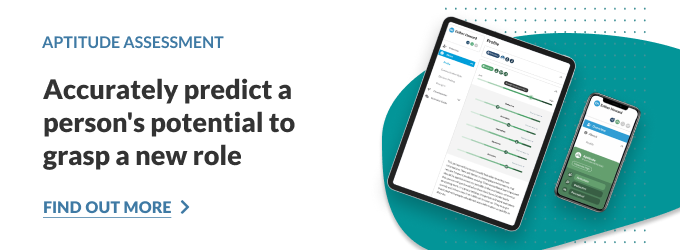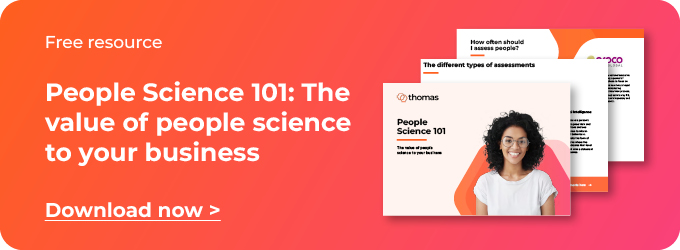Have you ever heard of cognitive ability? The answer is more than likely, yes. But what does it mean when it comes to the workplace?
In short, cognitive ability is the strongest predictor of job performance for all employment levels across industries. Being able to test the cognitive abilities of candidates at interview stage or even your current employees will give you an insight into learning and reasoning abilities in order to help predict a candidate's future aptitude for the position.

From problem solving to planning, abstract thinking to complex idea comprehension, a greater understanding of cognitive ability testing will give you better results in the quality of hiring decisions and in return, improve your company’s bottom line.
We are going to take a closer look at cognitive ability throughout this guide and show how it can greatly help influence your hiring decisions and the overall success of your business over time. Finally we will also take a look at Thomas’ assessments which will help you get a further practical understanding of cognitive ability and how it can be implemented in your workplace.
What is cognitive ability?
Cognitive ability at its most basic level is needed for human adaptation and survival. Known as general intelligence it is our ability to think abstractly, understand complex ideas, learn quickly and from experience.
It is one of the most studied topics in the field of behavioural genetics. Taking into account the ability for someone to reason, to think in abstract terms, understand complex ideas and learn quickly, cognitive ability is about comprehending situations and figuring out what is required to overcome or solve a problem, and plan ahead in how to do it.
It also goes beyond job performance. There is a general consensus that cognitive ability is a great predictor of educational success and even how healthy (or not) you’re going to be. This is because there is a certain reasoning of how genetics and environment make up cognitive ability in adolescence and how the choices we make at this crucial time will go on to shape our future success.
What is a cognitive ability assessment?
A cognitive ability assessment is used by employers and hiring managers to assess a candidate’s ability to process information whilst working in a set amount of time. The assessments are generally broken down into individual segments such as verbal, nonverbal and numerical tests.
The format, the question type, the user experience and even the content will widely vary across different cognitive ability assessments. Fundamentally, it all depends on what the tests are trying to measure and how the individual interpretations are going to be used to help form the hiring decisions.
Traditional testing methods have included written exams where a piece of paper with either a graph, table, picture or paragraph is used with a candidate and the questions are related to whatever is on the paper. The examinee will be asked to interpret what is on the paper and is presented with several options from which they choose the correct answer. Some exams include constructed answers, or even getting the examinee to write their own answers.
Each assessment can be used for different job roles and purposes as well. Logical reasoning assessments are essential for roles which require complex problem-solving and decision-making characteristics. Numerical Reasoning assessments predict performance for jobs that require numerical insight, abstract thinking and analytical problem-solving.
Using these tools correctly especially for the positions you have within your organisation can be of great benefit over time to help identify the right candidate that can show the necessary cognitive reasoning in order to do their job to the best of their ability.
How are cognitive ability tests used?
Cognitive ability tests are used as a great tool for employers and hiring managers to be able to assess how a candidate will perform in the role, without having to make a hiring decision to be certain. In short, they are used to help predict how well someone will perform in the role that is being advertised.
Imagine if you had the ability to know how well someone would perform based on the kind of the tasks that are required on a day to day basis. Now think back to when you have looked at candidates in the past and thought that they were perfect for the role to later discover that they weren’t.
That’s because things like C.V’s and even interviewing can be limited when it comes to discovering the candidate’s cognitive abilities. You won’t be able to correctly assess or interpret just how well they will perform from these measures at once.
All of the different tests which are used in discovering a candidate’s level of cognitive ability will provide insights as well as many advantages for employers and hiring managers.
From being able to predict job performance to identifying hidden potential, the essential part in all of this is that the cognitive tests can be used to help you discover more in a recruitment drive than just standard C.V. selection.
We are going to take a closer look at the different kinds of tests and what their ability to measure looks like and why it is important.
What are the different types of cognitive ability tests?
Traditionally, there are six types of cognitive ability tests; these include; numerical reasoning, verbal reasoning, spatial ability, logical reasoning, learning agility and perceptual speed and accuracy. To make it even simpler, they can be broken down into verbal cognitive ability, nonverbal cognitive ability and numerical cognitive ability.
Verbal cognitive ability
Verbal intelligence is the ability to assess information and solve problems using language based reasoning. This may involve reading or listening to words, conversations or even writing. Our world is built around the construct of being able to take on information where listening to or reading words for meaning and expressing knowledge through spoken language is needed.
Testing verbal cognitive ability can include, listening to and recalling spoken information; solving language based problems of a literary or logical nature or understanding the meaning of the passage of text.

Nonverbal cognitive ability
Nonverbal intelligence better describes the thinking skills and problem-solving abilities that don't require verbal language production and comprehension. This is used with the kinds of tests that require manipulating or problem solving visual information and vary in the amount of internalised, abstract or conceptual reasoning to complete a task.
Testing nonverbal cognitive abilities can include pattern recognition in shapes, identifying sequences in colour patterns and even measuring a candidate's ability to work with new concepts and ideas.
Numerical cognitive ability
Numerical intelligence is specific to understanding a candidate’s numerical and mathematical skills without it necessarily being a maths test. It is trying to discover a person’s ability to work with numbers and how you interpret that data as well.
There are several components to a numerical cognitive ability examination, these include numerical computation, estimation, reasoning and data interpretation.
When it comes to recruitment and selection, understanding the role you need filling alongside with the cognitive abilities that are required, selecting the right tests will help you find a candidate that is most suitable for the role and that goes beyond what a C.V. says.
What cognitive ability tests measure
Cognitive ability tests assess the abilities involved in thinking. For example, reasoning, perception, memory, verbal and mathematical ability as well as problem solving. The assessments are designed to pose questions which estimate an applicant's potential to use mental processes to solve work-based problems or the ability to acquire new skills on the job knowledge.
Retained attention
This is the ability to look around, react to, and learn about tasks over a period of time. Critically, you want to be able to know how long the person can retain focus.
Learning new skills requires retained attention above all other skills. Sustained concentration is the capacity to concentrate on an action or stimulation.
Response suppression
Response suppression or response inhibition is the ability to constrain one's own reaction to diversions. For example, you put two people in a room watching a lecture on screen. There is a minor distraction and one of the people turns around - that person has a lower response inhibition than the one that didn’t.
How well someone responds or in this case, doesn’t respond to external stimuli shows level-headed balance and composure, critical in stressful situations.
Pace of information analysis
Pace of information analysis is related to how easily a learner can interpret acquired information. Some researchers relate this area to IQ.
The faster the processing pace, the better you are capable of thinking and understanding better efficiently.
Cognitive regulation & versatility
This is another way of understanding your mind and your capacity to adjust your mind, to alter what you think about, the way you think about it, and even when you think about it. This is something that is required on a day to day basis.
Multiple simultaneous focus
This ability to solve a problem with effectiveness is multiple simultaneous focus. This is where you can work and switch between two or more operations involved in them. In other words, you are better equipped at multitasking.
Functional memory
How you retain knowledge or even the capacity to recall commands long enough to execute activities is functional memory. It is a neural mechanism that has a small ability which may retain knowledge momentarily. Working memory is essential for thinking and the direction of decision-making and conduct.
Categorisation
This is how the brain classifies things and activities. This activity is the foundation of our understanding of the universe. It is also the most important aspect of learning and the essential topic of cognitive science.
Categories are the foundation of the world’s vocabulary and organisation.
Pattern identification
Identifying trends and consistencies in data pattern recognition is pattern identification. There are many uses of this ability in day to day life and in the professional world.
How Thomas can help you assess cognitive ability
There are of course ways to measure a candidate’s cognitive ability and the Thomas Aptitude test is specifically designed to help organisations do so.
Using 5 different assessment methods, including reasoning, perceptual speed, number speed and accuracy, word meaning and spatial visualisation, the Thomas aptitude assessment is one of the most thorough and leading assessments in the marketplace. From these assessments, you will be able to gain a detailed understanding of a person’s mental capacity and how quickly they can grasp a new role/regime.
Measuring the aptitudes of a candidate helps you to understand if that individual will be able to quickly grasp the requirements of the role. It can give you an insight into whether they have the capacity to adapt to new challenges, and if they would be suited to drive change through your organisation.
Aside from taking the candidate’s word for it, or just using an interview technique that we have all faced, the Thomas aptitude assessment delivers a rounded approach to candidate selection and even current employee development paths, strengthening the business.
At Thomas, we can have the tools to get the job done and help you find the right assessment to get you and your team up to scratch. For more information on our aptitude assessment tools, speak to us.





